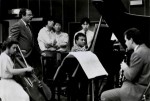Title
Though a career in the performing arts often requires the wearing of many hats, composer, educator, and administrator Bruce MacCombie has done more than his fair share to keep the haberdashers in business. Former director of publications for G. Schirmer, former dean of The Juilliard School, former executive director of Jazz at Lincoln Center, and now professor of composition at the University of Massachusetts in Amherst, Mr. MacCombie, 65, is one of those rare individuals who are equally adept and comfortable behind almost any desk. This month, Juilliard welcomes him back for the premiere of his newest orchestral work, Samsara Rounds.
Body
"Samsara is a Buddhist concept," MacCombie explained in a recent interview, "and it has to do with the [idea] that we are all travelers on the wheel of life. I'm not a practicing Buddhist, but I've read a great deal in recent years about these concepts. For some Buddhist sects, samsara has to do with the aspect of reincarnation. You are born into various lives—and usually you suffer in those lives—and you live them until finally you reach nirvana." MacCombie said he is also interested in certain aspects of meditation which "include the process of our being able to imagine new worlds in our minds and move into them and actually live there in creative ways."
Much of the inspiration for this work came as a result of MacCombie's efforts to cope with some recent health problems. "I found certain kinds of meditation during the coping with these illnesses to be very useful—sometimes more useful than medications," he said. "Being able to put your mind in a good place can be very helpful in these kinds of situations. It seemed natural to write a piece that evoked that kind of meditation." He noted that the commission came at the right time: "Having the goal of getting the piece done inspired me a lot to keep going. I didn't want to not complete the piece."
The compositional material for Samsara Rounds, which will be just under 14 minutes long, derives from one of MacCombie's earlier works, Still Life, for wind quintet. This work contains a theme which its composer could not let go of. "I got really fascinated with the tune, and I used it again and again. It repeats, it gets bigger and bigger, reaches a climactic point, and then has a bit of reprise at the end. I guess this piece kind of became my ‘slow Boléro.'"
MacCombie's catalog is by his own admission modest—his publisher, Schott Music, advertises 20 works. Almost every piece, however, has been commissioned and championed by a great performer or ensemble. His works have been played throughout the world by the likes of guitarist Sharon Isbin and the Seattle Symphony. When he was awarded a fellowship from the American Academy of Arts and Letters in 1979, he was praised for producing "polished gems of musical understatement. Characterized by a fresh and penetrating wit, they sparkle and yet are clothed in mystery."
"I find it hard to compare myself stylistically with other composers," MacCombie reported, "but people that I've admired include Stephen Albert, Joseph Schwantner, Joan Tower, and Christopher Rouse."
As a member of that generation of composers, MacCombie has witnessed some remarkable changes in the music industry, and is particularly aware of those that have occurred in the field of music publishing. "It's a tough business," he observed. "They don't make any profits on the sale of sheet music anymore. [In the past] people owned pianos and would buy sheet music, and the family would sit around and play music. Publishers did well, composers did well. Then radio came along, records came along. Publishers were kind of left out of the loop. They had a chance to get into different media and they just didn't do it. Lo and behold, the paper business went down and everything else went up. Income now is basically derived from performance rights ... all the non-paper stuff."
He added, though, that although the advent of new technologies may have harmed the printing business, it has freed composers to self-publish, and thereby establish their own terms for advertising and distributing their work. "I don't think it's that important anymore to have works published by a big house," he claims. That is quite a statement from the former director of one of America's leading music publishing firms.
At the same time, he laments the effects of recording technology on the popularity of live concerts. "We have to hope that there's still a demand for live performers. There's nothing that can beat it. I think it's a challenge to keep it alive because most people in this country are used to hearing music over speakers and they don't care that much about whether it's live sound or not. People have gotten used to everything being compressed and equalized. Play an LP compared to a CD. It's quite different; it's quite a bit richer. It's a big challenge to all of us in the business to keep live music really alive."
MacCombie says he is glad to have enjoyed such a varied and interesting career, as well the opportunity to have parallel careers as an artist and arts administrator. "I haven't written a lot of music, but I can't say that I had a lot more in me, so to speak. It's fun to be involved in the world and with people, and to help young people especially. I've usually had one commission or so a year the past 20 years. It's a nice mix."
Of course, he is thrilled about returning to his former home, where he served as dean from 1986 to 1992. "The student orchestra is wonderful," he observes. "It always has been, and the performances at Juilliard are just spectacular. The students' attitude is always so good; they really want to do well and make things work well. It's unique."





